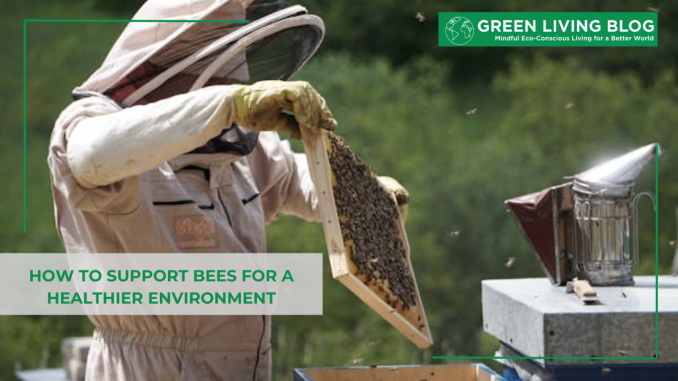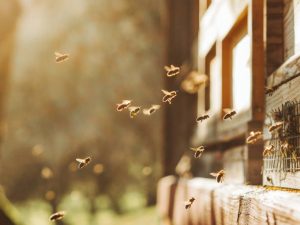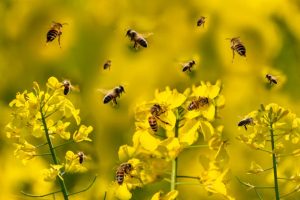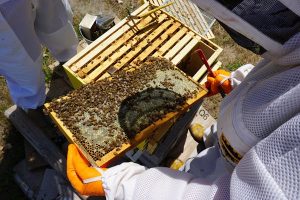
Bees play a crucial role in our world. They pollinate plants, help produce food, and keep ecosystems balanced.
But bee populations are declining, which is bad news for the environment and for us.
The good news? There are simple ways we can help support bees and create a healthier environment for everyone.
Why Bees Matter

Bees are nature’s top pollinators. As they fly from flower to flower collecting nectar, they spread pollen, allowing plants to reproduce. This process is essential for many of the fruits, vegetables, and nuts we eat every day. Without bees, our food supply would look very different – and not in a good way.
But it’s not just about food. Native bees help maintain biodiversity by pollinating wild plants, too. This keeps our natural areas thriving and provides habitats for other wildlife. In short, bees are a cornerstone of healthy ecosystems.
The Buzz on Bee Decline
Sadly, bee populations are shrinking worldwide. Several factors contribute to this decline:
- Pesticide use: Many common pesticides are harmful to bees.
- Habitat loss: As we develop land, we often destroy natural bee habitats.
- Climate change: Shifting weather patterns can disrupt bee life cycles.
- Disease: Parasites and viruses can devastate bee colonies.
Now, to make sure that you don’t contribute to their declining population, you can take proactive steps on your end. For example, if you are wondering how to get rid of a wasp nest or a bee hive, instead of killing them, you can always contact professional insect removal services with insect-friendly methods for transferring them. This way, you’re not only keeping your family safe from native bees but also helping reverse the declining population of bees.
Creating a Bee-Friendly Garden
One of the best ways to help bees is by making your garden a haven for them. Here’s how:
1. Plant Bee-Friendly Flowers

Bees love flowers rich in nectar and pollen. Some great options include:
- Lavender
- Sunflowers
- Marigolds
- Zinnias
- Coneflowers
Ensure your garden has flowers blooming throughout the growing season to provide a steady food source for bees from spring to fall.
2. Avoid Pesticides
Chemical pesticides can harm or kill bees. Instead, try natural pest control methods like companion planting or hand-picking pests. If you must use pesticides, choose bee-safe options and apply them when bees aren’t active, like early morning or late evening.
3. Provide Water
Bees need water, too. A shallow dish with pebbles for bees to land on makes a perfect bee water station. Remember to change the water regularly to keep it fresh.
4. Leave Some Wild Areas
Don’t be too tidy in your garden. Leave some areas wild with native plants. Many native bee species nest in the ground or in hollow plant stems. A bit of ‘mess’ can be a perfect home for them.
Supporting Bees Beyond Your Backyard

Your efforts to help bees don’t have to stop at your garden gate. Here are some ways to support bees in your wider community:
1. Buy Local, Organic Produce
Supporting local, organic farmers helps promote bee-friendly farming practices. Organic farms don’t use harmful pesticides, creating safer environments for bees.
2. Support Beekeepers
Buy local honey and beeswax products. This supports beekeepers who maintain healthy hives. Some beekeepers also offer pollination services to farmers, helping both agriculture and bee populations.
3. Spread the Word
Share what you’ve learned about bees with friends, family, and neighbours. The more people understand the importance of bees, the more support these crucial insects will have.
4. Get Involved in Community Projects
Many communities have bee-friendly initiatives. These might include planting pollinator gardens in public spaces or setting up community beehives. Look for opportunities to get involved or even start your own project.
Making Better Consumer Choices
The products we buy can have a big impact on bees. Here are some bee-friendly shopping tips:
1. Choose Eco-Friendly Products
Look for household products, especially gardening items, that are bee-safe. This includes everything from cleaning supplies to lawn care products.
2. Opt for Sustainable Fashion
The fashion industry often uses pesticides in cotton production. By choosing organic or sustainably produced clothing, you’re indirectly supporting healthier environments for bees.
3. Read Labels
When buying plants, check if they’ve been treated with neonicotinoids, a type of pesticide harmful to bees. Many retailers now label their plants as ‘neonic-free.’
4. Education and Awareness
Learning more about bees and sharing that knowledge is a powerful way to help. Here’s how to become a bee advocate:
5. Learn to Identify Bees
There are thousands of bee species, each with its own role in the ecosystem. Learning to identify different types of bees in your area can deepen your appreciation for these insects.
6. Teach Others
Share your knowledge with others, especially children. Teaching the next generation about the importance of bees helps ensure long-term support for these vital pollinators.
7. Stay Informed
Keep up with news and research about bees. This can help you make informed decisions and adapt your bee-supporting strategies as new information becomes available.
Final Thoughts
Supporting bees might seem like a big task, but it’s the small, everyday actions that make a difference. Every flower planted, every pesticide avoided, and every person educated about bees contributes to a healthier environment for these essential insects.
Remember, helping bees isn’t just about saving bees – it’s about preserving the intricate balance of our ecosystems. By supporting bees, we’re supporting biodiversity, food security, and the overall health of our planet.
So, the next time you see a bee buzzing around your garden, take a moment to appreciate the vital work it’s doing. And consider what small step you can take to make life a little easier for these hardworking insects. After all, when bees thrive, we all benefit.
![]()
Author Profile
- Passionate content creator, contributor, freelance writer and content marketing allrounder.
Latest entries
 Green Expert GuidesApril 25, 2025Comparing Emissions: Natural Gas Vehicles vs. Electric Vehicles in the Quest for Sustainability
Green Expert GuidesApril 25, 2025Comparing Emissions: Natural Gas Vehicles vs. Electric Vehicles in the Quest for Sustainability Green LivingApril 17, 20254 Eco-Friendly Habits to Pair With Your Herbal Tea Ritual
Green LivingApril 17, 20254 Eco-Friendly Habits to Pair With Your Herbal Tea Ritual Best practicesApril 12, 2025Top 6 Eco-Friendly Choices for Sustainable Living in Your Everyday Life
Best practicesApril 12, 2025Top 6 Eco-Friendly Choices for Sustainable Living in Your Everyday Life BusinessMarch 31, 2025How to furnish your Office with sustainable Cardboard Furniture
BusinessMarch 31, 2025How to furnish your Office with sustainable Cardboard Furniture






Leave a Reply
You must be logged in to post a comment.